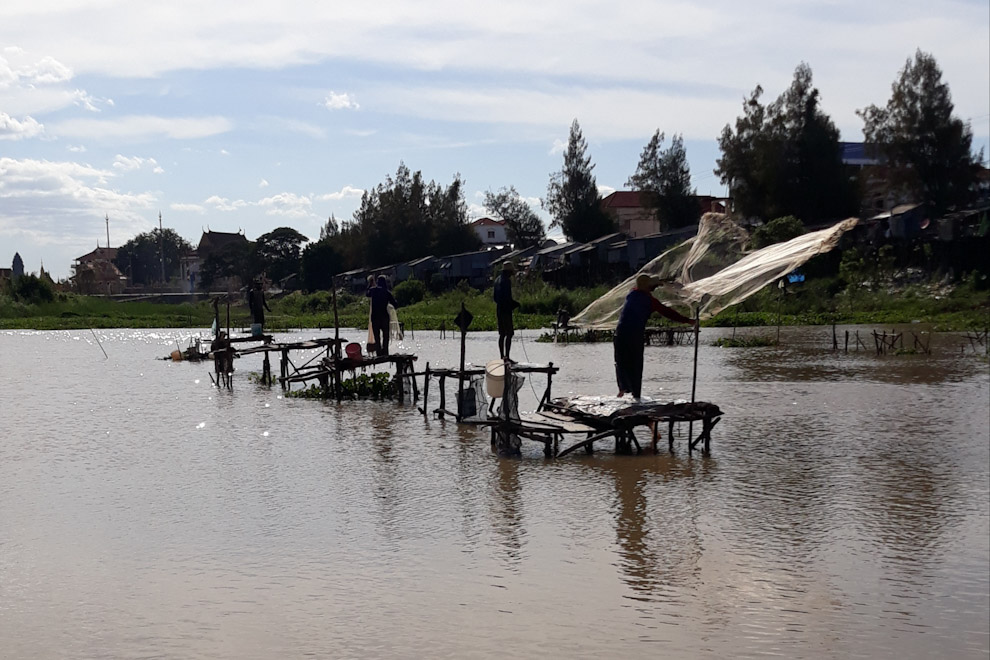Government officials from Cambodia, Laos, Thailand and Vietnam approved a joint drought management strategy for 2020-2025 on Tuesday but did not disclose the details of how they would confront the worst drought afflicting the region in 60 years.
“As we gear up for drought preparedness and mitigation, this strategy will help us reduce the vulnerability of our people and water resource systems to droughts, improve the adaptive capacity of our governments, and advance our information sharing, forecasting and early warning systems,” said Lim Kean Hor, Cambodia’s Minister of Water Resources and Meteorology, in a statement.
The Mekong River Commission said the strategy would focus on five priority areas that have been assessed as “poorly functioning” and requiring “immediate attention,” including drought monitoring and information sharing. It did not mention the estimated 315 dams on the Mekong across six countries.
Laos last month launched commercial operations of its Xayaburi hydropower dam on the lower Mekong River amid protests from villagers in Thailand who say the dam and several others in the works will destroy their livelihoods, Reuters reported.
The 1,285-megawatt Xayaburi dam’s launch came as the Mekong is seeing the lowest water levels in recent living memory. The dam is the first of at least nine further hydropower projects either under construction or planned on the lower Mekong in Laos, according to Reuters.
During the Mekong River Commission’s 26th council meeting in Phnom Penh on Tuesday, Cambodia, Vietnam and Thailand urged all countries to work together to prepare and manage the droughts, while Laos promised to listen to criticisms and improve.
“In this critical situation and to jointly address all of these effectively and sustainably, it requires our stronger cooperation and our joint efforts with higher attention in practical terms,” Te Navuth, permanent vice-chairman of Cambodia’s National Mekong Committee, told the meeting.
Navuth said the Mekong’s low water levels were leading to “growing serious concern” of severe drought this year and negative impacts on the social and economic progress of member countries and the ecosystem of the Mekong as a whole.
Navuth said the Tonle Sap Lake’s flow reversal was late and short-lasting this year compared to previous years.
“It [has] affected the natural productivity of the lake, that the lake normally serves and provides for the Mekong system and riverine communities as well as for the country as whole,” Navuth said.
Vietnam’s deputy minister of natural resources and environment, Le Cong Thanh, said the abnormal drop in water levels had strongly affected his country.
“In addition to saline intrusion, which tends to occur earlier with deeper extent, the river bank and coastline erosion, and land subsidence have become more complicated both in extent and degree, causing direct threats to the lives and properties of the people in the delta,” Thanh said.
Thailand, which buys electricity from Xayaburi in Laos, according to Reuters, said on Tuesday that it supports actions to address transboundary risks and impacts, particularly from climate change, including knowledge and data sharing.
Laos, which will also sell its electricity to Cambodia, said it acknowledges the “legitimate concerns” of member countries and partners on the hydropower development, but defended the development as having been done in “the most responsible, sustainable, technologically advanced” way.
“As both a landlocked and least developed country, it is Lao government policy to lift its people out of poverty, and gradually not to rely much on foreign aid,” said Saynakhone Inthavong, deputy minister of natural resources and environment.








